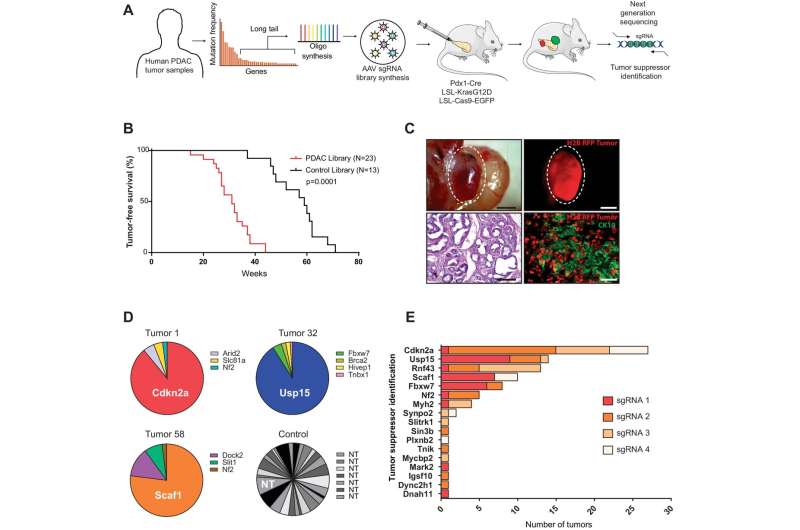This article has been reviewed according to Science X's editorial process and policies. Editors have highlighted the following attributes while ensuring the content's credibility:
fact-checked
peer-reviewed publication
trusted source
proofread
Study identifies two critical genes in pancreatic tumors

University of Toronto researchers have identified two genes that play a critical role in tumor growth in the pancreas—findings that have significant implications for understanding and treating pancreatic cancer.
The tumor suppressor genes USP15 and SCAF1 were discovered by a research team led by Daniel Schramek, a senior investigator at the Lunenfeld-Tanenbaum Research Institute (LTRI) and deputy director of discovery research and Tony Pawson Chair in Cancer Research at Sinai Health.
The team found that people who have mutations in these genes are more likely to develop fast-growing tumors—but these tumors are also more susceptible to chemotherapy. The findings, described in a study published in Nature Communications, mark a significant step forward in research on pancreatic cancer, a disease that has seen little progress in treatment options.
"While mutations in USP15 and SCAF1 make tumors more aggressive, they also sensitize tumors towards standard chemotherapy," says Schramek, who is also an associate professor in the department of molecular genetics and Canada Research Chair in functional cancer genomics at the Temerty Faculty of Medicine. "And that means that you could stratify patients and they should have a better response to treatment."
The project was spearheaded by Sebastien Martinez, a former postdoctoral fellow at LTRI who is now a senior scientist at Centre de Recherche en Cancérologie de Lyon (CRCL) in France.
Pancreatic cancer continues to have few treatment options with devastatingly low survival rates, under five years post-diagnosis. According to one estimate, pancreatic cancer could be the second leading cause of cancer deaths in the United States by 2040.
Schramek's team achieved their breakthrough by leveraging advances in genomic medicine, specifically tumor DNA sequencing, to identify mutations and genome editing technologies.
"Sequencing tumors allows you to find the genes that are affected and use that knowledge to develop treatments. But the problem is that every cancer has a plethora of mutations, and not all of them are disease-causing," says Schramek.
Cancers often feature common mutated genes in many patients, along with hundreds of less frequent mutations that appear in a smaller subset. While mutations in USP15 and SCAF1 were found in less than 5% of patients, their effects on cancer remained unclear.
Traditionally, tumor suppressor genes have been pinpointed by sequentially deleting genes in cancer cell lines and noting which deletions increase cell growth. However, these cell-based studies don't replicate the tumor's natural environment and interactions with the immune system, which are crucial for cancer progression. This likely explains why previous screens overlooked USP15 and SCAF1.
A few years ago, Schramek's team developed a genome editing approach enabling them to remove hundreds of genes simultaneously from individual cells. This method helps identify genes that when absent, trigger cancer in the natural body environment.
Utilizing this technology, the Schramek lab targeted 125 genes recurrently mutated in patient pancreatic tumors and pinpointed USP15 and SCAF1 as crucial tumor suppressors and potentially prognostic factors for chemotherapy response.
It just so happens that these genes are also absent in about 30% of patients due to common genomic rearrangements in cancer.
This finding indicates that as many as a third of pancreatic patients who lack these genes might benefit from chemotherapy and have better outcomes.
"Historically, mutations in USP15 and SCAF1 would have been considered less important because they are not found in many patients," Schramek says. "Our work shows that it is critical that we understand the functional consequences of these rare mutations as they can reveal new biology and therapeutic opportunities"
Anne-Claude Gingras, director of the Lunenfeld-Tanenbaum Research Institute and vice-president of research at Sinai Health, says the study "represents an important step forward in our understanding of the genes involved in pancreatic cancer.
"It also shows how a cutting-edge technology developed at Sinai Health is enabling new discoveries with the potential to create benefits to patients."
More information: Sebastien Martinez et al, In vivo CRISPR screens reveal SCAF1 and USP15 as drivers of pancreatic cancer, Nature Communications (2024). DOI: 10.1038/s41467-024-49450-3




















